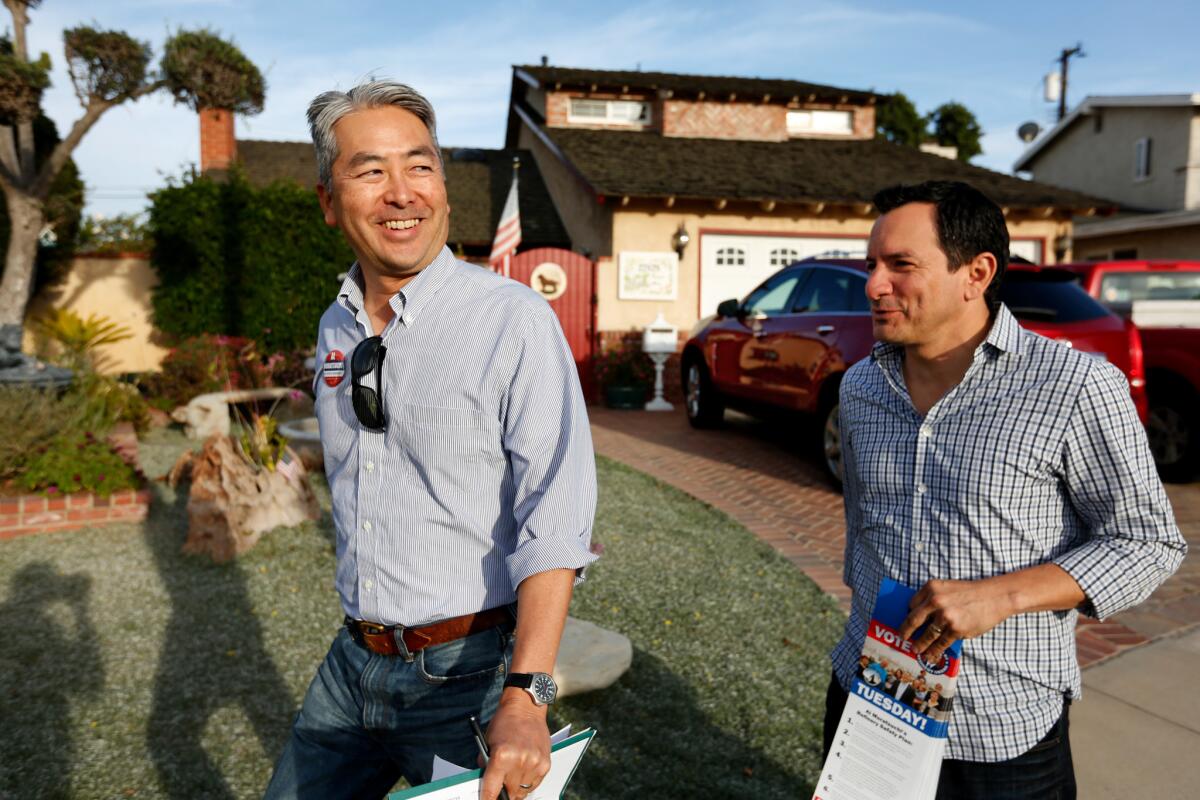Democrats play the waiting game in their quest to reclaim supermajority status in the Legislature

- Share via
Reporting from Sacramento — California Democrats eagerly awaited election day for the chance to regain something lost two years prior: A supermajority of seats in both houses of the Legislature, the kind of dominance with which they could easily raise taxes, send proposals to the ballot or override the veto of a reluctant governor.
Those hopes haven’t been fully realized in early returns, though Democrats appear to have crossed the two-thirds barrier in the state Assembly.
“I think we’re expanding the map,” said Assembly Speaker Anthony Rendon (D-Paramount) on Wednesday, after unofficial results showed Democrats winning as many as 55 seats, one more than a supermajority, in his chamber. “I think people understand everything we’ve accomplished, and it’s a rousing endorsement of that.”
In the state Senate, where Democrats needed to pick up only one additional member to hit a supermajority of 27 seats, the effort may have come up short. But because ballots can arrive in elections offices as late as next Monday, the final verdict may remain in doubt for a week or longer.
“Because our election laws are voter-friendly, the ballots get counted over an extended period,” said Darry Sragow, the publisher of the Target Book, which analyzes legislative and congressional races across the state.
Democrats may ultimately find the close races swinging their way, but it doesn’t appear to be the strong wave that some strategists privately suggested as recently as Monday — predictions that the state’s largest political party would see a net gain of perhaps eight or nine legislative seats over Republicans. Even in a state as reliably blue on the electoral map as California, Democrats might have gone into election day with too much optimism.
Political Road Map: A Democratic supermajority in Sacramento may not change much »
“Democrats, in a lot of places, misread things,” Sragow said.
In two Southern California races, Republicans looked to have lost to Democrats in rematches of races they won in 2014. Assemblyman David Hadley (R-Manhattan Beach) was defeated by the man who held the seat two years earlier, Al Muratsuchi. And in Orange County, Assemblywoman Young Kim (R-Fullerton) was losing in Tuesday-night returns to her opponent of two years ago, Sharon Quirk-Silva.
Democrats may have also picked up a new Assembly seat in Riverside County, with Sabrina Cervantes leading Assemblyman Eric Linder (R-Corona) by more than four percentage points. Thirty-five percent of voters in the district are Latino, an important dynamic in several contested races across California.
“We are substantially a minority-white state,” Sragow said. “Ethnicity does matter in California politics.”
That could have also boosted Eloise Reyes in her defeat of fellow Democrat Assemblywoman Cheryl Brown (D-San Bernardino). Brown, a business-aligned Democrat who is African American, lost to the more liberal Reyes in an Assembly district, where 52% of the voters are Latino and only 5% are African American.
The Reyes-Brown race was perhaps the marquee legislative matchup for interest groups seeking to influence the final outcome, with some $70 million spent by independent political action committees, a 44% increase from the record set just two years earlier.
Democrats have held sizable majorities in the state Capitol for more than two decades, but no party had won a supermajority of seats for some eight decades until Democrats did so in 2012. That was the first presidential election cycle under districts drawn by California’s independent Citizens Redistricting Commission.
In the state Senate, Democrats needed only a single pickup but had to do so in districts that have been historically more friendly to Republicans. The only race still is east of Los Angeles, where Assemblywoman Ling-Ling Chang (R-Diamond Bar) holds a lead of less than 3,900 votes over veterans advocate Josh Newman.
Senate President Pro Tem Kevin de León (D-Los Angeles) warned about making too much of the quest for a Democratic supermajority in Sacramento.
“We’ve proven that you don’t need to be a supermajority to be highly effective.” he said. “It’s still the quality of our work, not the quantity of our head count, that matters the most.”
Follow @johnmyers on Twitter, sign up for our daily Essential Politics newsletter and listen to the weekly California Politics Podcast
ALSO:
Political Road Map: A supermajority in the Legislature may not change much
Here are the Legislature’s wins and losses over its recent two-year session
Updates on California politics
More to Read
Get the L.A. Times Politics newsletter
Deeply reported insights into legislation, politics and policy from Sacramento, Washington and beyond. In your inbox twice per week.
You may occasionally receive promotional content from the Los Angeles Times.










